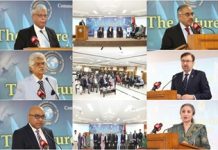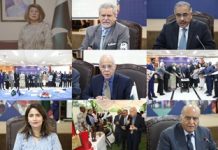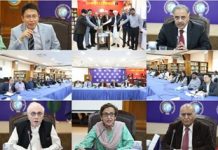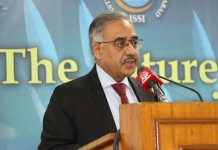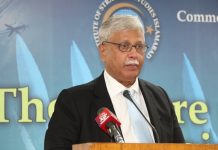Remarks by Director General ISSI, Ambassador Sohail Mahmood, at Seminar on “United Nations and the Jammu and Kashmir Dispute”
ISSI, October 24, 2024
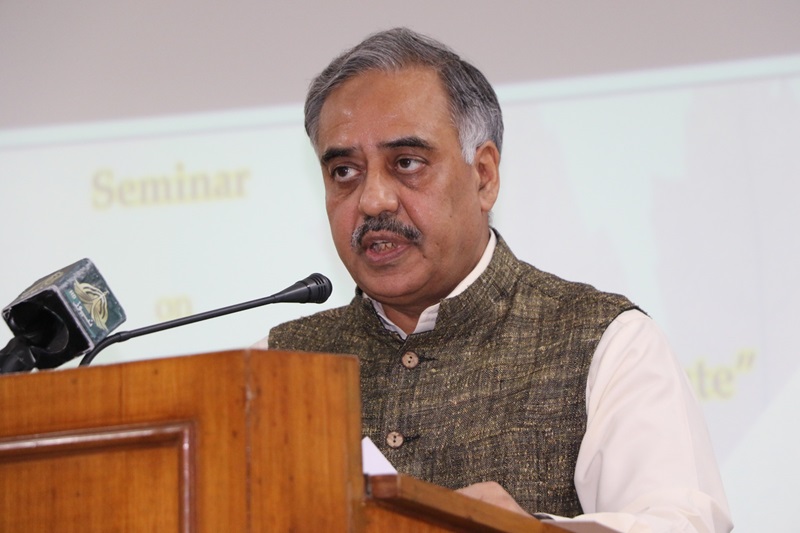
It is a pleasure to welcome everyone to this Seminar on the “United Nations and the Jammu and Kashmir Dispute.”
On behalf of ISSI, I express our deep appreciation for the participation of former President of AJK Ambassador Masood Khan, and all other esteemed speakers from the political, academic, and think-tanks spheres.
I also wish to extend a special welcome to the young students we have from the International Islamic University and the National University of Modern Languages. Engaging the nation’s youth in our research work and policy discourse is a vital component of the ISSI’s new vision.
Today is UN Day – 24th October. It marks the entry into force in 1945 of the United Nations Charter. On 31st October 1947, the UN General Assembly adopted a resolution, declaring that the Day would be devoted to raising awareness of the goals and achievements of the Organization and gaining support for its work.
The UN Day is observed globally. Usually, it is an occasion for the international community to reaffirm its commitment to promoting international peace and security; advancing sustainable development; upholding human rights; fostering global cooperation; advocating multilateralism; and celebrating diversity and unity.
However, as we mark the UN Day in 2024, we sadly see the world ravaged by ongoing wars and nearly 56 active military conflicts involving 92 countries across the globe. At the same time, we see a proliferation of non-traditional security threats and challenges — from climate change to unregulated growth and militarization of new technologies to misinformation and disinformation. We see wilful flouting of the established norms of inter-state relations – with increasing use of force to settle disputes and unabated commission of crimes against humanity with impunity.
In the economic and social realms, we see the world still reeling from the global slowdown, which was accentuated by the COVID-19 pandemic. We hear news of the early demise of globalization. We see reversals in the realisation of SDGs. We see democratic backsliding as well as progress reversing in the timeless values such as freedom, equality, inclusivity, social justice. Solidarity and International Cooperation keep losing currency. We see multilateralism itself under assault. Multilateral institutions, especially the United Nations, facing a relentless onslaught – with humanitarian workers and peacekeepers being attacked, and even the Secretary General being the target of a malicious campaign.
Clearly, these are not easy times for the United Nations, an institution that has served humanity in so many areas from peace and security to sustainable development. From norm-setting to law-making, and from health to food security to climate change, the UN continues to provide strong impetus for collective action to address shared challenges. Admittedly, there have been shortcomings, but these are attributable more to the acts of omission and commission by concerned member-states than the institution. That the institution needs constant renewal is beyond question; but a lot depends on what member-states are willing to allow it to be. If some in the institution decide to address issues on the basis of power, rather than principle, then the institution itself is less blamable. If resolutions seeking to call out aggression and disproportionate use of force are vetoed, then we are condemned to helplessly watch a genocidal war continue unabated. If we member-states do not empower the UN to play its rightful role, it will remain powerless to come up to our expectations.
Distinguished participants,
Let’s now review UN’s work on Kashmir. The United Nations has been seized of the Jammu and Kashmir dispute since 1 January 1948, when it was first brought to the world body by India. The United Nations Commission for India and Pakistan (UNCIP) and later the UN Security Council deliberated threadbare on different aspects of the issue and came up with a clear solution, based on a cardinal principle of the UN Charter: A free and impartial plebiscite under the UN auspices to enable the Kashmiris to exercise their right to self-determination. The Security Council resolutions were accepted by India, Pakistan, and the international community. But India later changed its position and reneged on its solemn commitments. Several decades down the line, this position continues to persist.
On the ground physically, the observers belonging to UNMOGIP remain the most visible symbol of the United Nations’ uninterrupted involvement in the Jammu and Kashmir dispute since the 1940s. The UNMOGIP is one of the oldest UN missions, stationed to monitor the situation on the Line of Control (LoC) and report to the Headquarters in New York. Again, India remains opposed to the mission and employs different means and methods to constrict its movement and mandate.
The United Nations has remained equally concerned about the human rights situation. The office of the UN High Commissioner for Human Rights issued two successive reports on Kashmir in 2018 and 2019, documenting the gross and systematic violations of human rights of the Kashmiris and recommending the establishment of a Commission of Inquiry for further investigation. While Pakistan welcomed the recommendations, India has obstinately opposed both this process and its outcome. New Delhi remains determined to stymie any further action in the HRC.
The United Nations has remained steadfast in preserving the legal foundation of the Kashmir dispute as well. Within days of India’s illegal and unilateral actions of 5 August 2019, which aimed to alter the internationally recognised disputed status of Jammu and Kashmir and change the demographic structure of the occupied territory, Secretary General Antonio Guterres articulated the UN position in unambiguous terms. The Secretary General made clear that as far as the UN is concerned, the Kashmir question is governed by the UN Charter, applicable Security Council resolutions, and bilateral agreements between India and Pakistan. The Secretary General and his spokesperson have since repeatedly reiterated this principled position on many important junctures. I should add that the Secretary General has also, often, offered his Good Offices to facilitate a solution, but India remains intransigent and unresponsive.
Similarly, after a gap of 55 years, and despite India’s fierce opposition, the Security Council took up the Jammu and Kashmir question in August 2019 and then on two more occasions subsequently. This constitutes a powerful refutation of New Delhi’s fallacious claim that this is India’s “internal matter.” Indeed, Jammu and Kashmir is the oldest item on the Security Council’s agenda and India cannot pretend that the UN and the international community have nothing to do with it.
For its part, the Geneva-based UN Human Rights Council also deliberated on the issue after India’s illegal and unilateral actions of 5 August 2019. The successive UN High Commissioners for Human Rights in their oral reports to the Council from 2019 to 2022 raised their concerns about the human rights situation. The Special Rapporteur and Mandate Holders have also from time to time voiced their concerns over different aspects of the situation. In 2019, a group of 60 OIC and other countries also issued a joint statement from the HRC platform, rejecting the Indian actions and upholding the rights of the Kashmiris. India continues to exert pressure on OHCHR and the HRC members not to proceed with any further action on the matter. Yet, the reality is that the voice of the Kashmiris cannot be suppressed and the UN human rights machinery continues to find ways of articulating its views be it the general human rights situation in IIOJk or individual cases of human rights activists like Khurram Pervez and others.
Going forward, it is important to evaluate the UN’s past and future role both objectively and realistically. As we have seen, the UN has been focused on all three dimensions of the dispute — legal, human rights, and peace and security. It is important for us to be always mindful that the Security Council resolutions form the bedrock of Pakistan’s position in advancing the Kashmir cause. Equally, it is of fundamental importance to remember that the Kashmiri struggle for self-determination is just and legitimate, embedded in international law and Charter principles. Any attempt to equate this struggle with terrorism is a canard that must be rejected with contempt. Also, the Charter principles are immutable and there is no statute of limitations on Security Council resolutions. Pakistan is an active member of the UN and soon would also be assuming Security Council membership. These opportunities should be utilized with imagination and skill – that has been the hallmark of Pakistan’s diplomatic endeavours on Kashmir for more than 7 decades now.
Overall, we must move forward with national consensus and a whole-of-the-nation approach. We have to persist with deft and proactive diplomacy, mobilizing the international community to fulfil its pledges and obligations. Our diaspora – both Pakistani and Kashmiri – has a vital role in raising global awareness through political action and active Parliamentary and media outreach. We have to keep faith and persevere with our efforts. We must make sure that the sacrifices of generations of Kashmiris and Pakistanis would not be in vain and that the Kashmiri struggle will be crowned with success, inshaAllah.
Thank You!




